Search
 Video
Video
Anal Cancer: A Primary Care Guide to Risks and Screening
Infectious disease specialist Cristina Brickman, MD, MSCE, explains how common anal cancer really is, which HPV types are associated, which patient populations should be screened and when to start – and when to refer to a specialist. Videos demonstrate proper technique for anal cytology collection and digital anorectal exams. News
News
Alan P. Venook, MD, Recognized With Luminary Award for Gastrointestinal Cancers
Alan P. Venook, MD, a renowned expert in colorectal and liver cancers, has been announced as one of the winners of the 2022 Luminary Awards in Gastrointestinal (GI) Cancers. News
News
Panel Issues First Guidelines to Prevent Anal Cancer in People With HIV
Results from a national study led by UC San Francisco informed the first guidelines at the federal level in the United States to detect and treat anal cancer precursor lesions in people with HIV to reduce the risk of developing anal cancer. News
News
International Breast Cancer Conference Features UCSF Health Experts
Breast cancer experts from UCSF Health will present new research and clinical findings at the annual San Antonio Breast Cancer Symposium, the world’s largest and most prestigious breast cancer conference. This year’s meeting will be held Dec. 7-10.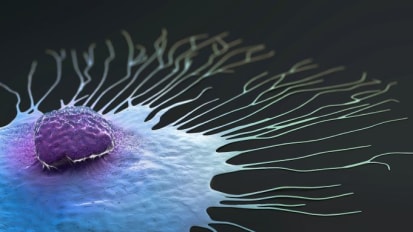 News
News
Breast Cancer Risk Calculator Can Assess Risk of Advanced Breast Cancer
Upcoming Conference to Focus on Breast Density and Prediction of Advanced and Interval Breast Cancer Risk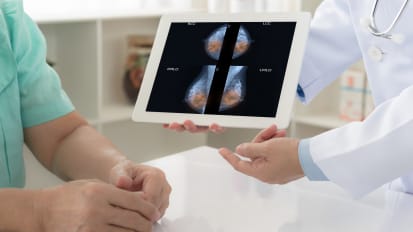 Video
Video
Breast MRI and Advanced Breast Intervention
Bonnie Joe, MD, PhD, discusses how breast MRI is performed, common indications for breast MRI and advanced methods for biopsy and pre-surgical localization of tumors.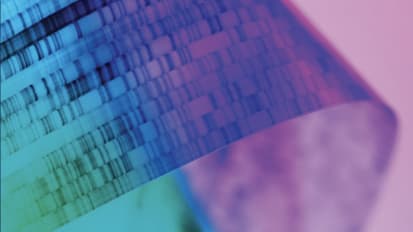 Document
Document
UCSF500 Cancer Gene Panel Test
The UCSF500 Cancer Gene Panel leverages world-class expertise for advanced cancer cases. Designed by our leading cancer specialists, the UCSF500 offers unparalleled depth and precision in genetic analysis.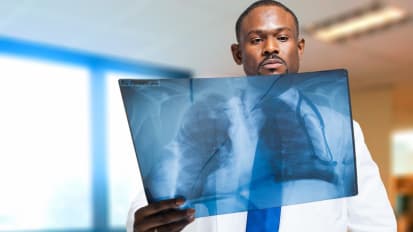 Video
Video
Lung Cancer Screening: Who, How and When to Refer
†horacic radiologist Brett M. Elicker, MD, and thoracic surgeon Johannes Kratz, MD, present about current lung cancer screening guidelines: who, how, and when to refer. Video
Video
Screening Guidelines for Common Cancers: A Lifesaving Update
In just 35 minutes, hematologist-oncologist Akshiv Malhotra, MD, presents the current recommendations on cervical, breast, colon and lung cancers, breaking down the test options for each and when to start tests based on a patient’s risk. News
News
Immune Cells Leave Fingerprints on Tumors Metastasized to the Brain Offering Clues to Future Therapies
Using data from over 100,000 malignant and non-malignant cells from 15 human brain metastases, UCSF researchers have revealed two functional archetypes of metastatic cells across 7 different types of brain tumors, each containing both immune and non-immune cell types. Their findings, published the February 17 issue of CELL, provide a potential roadmap for metastatic tumor formation that could be used to design therapies to improve the treatment of metastasized patients. Video
Video
Cancer Preventive Care: Empower Your Patients to Take Small-But-Significant Steps
Patients worry about cancer but struggle to make lifestyle changes. Here’s how to discuss factors they can control and realistic steps they can take. News
News
Sneaky Senescent Cells That Resist Cancer Treatment Can Provide Druggable Lung Cancer Target
Senescent fibroblasts are aging cells that no longer divide and protect against tumor development.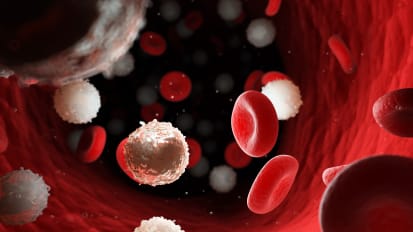 News
News
International Hematologic Conference Features UCSF Health Experts
Hematologists and oncologists from around the world will present new research and clinical findings at the American Society of Hematology’s (ASH) 63rd Annual Meeting and Exposition. This year’s meeting will be held in Atlanta, Georgia – and virtually – from December 11-14, 2021.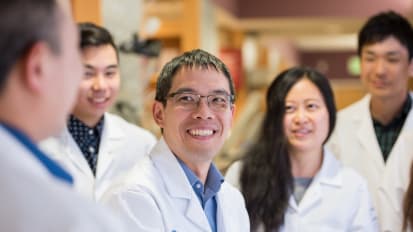 News
News
UCSF’s Lawrence Fong, MD, Earns NCI Award for Cancer Immunotherapy Research
The National Cancer Institute (NCI)has honored Lawrence H. Fong, MD, leader of the UC San Francisco Cancer Immunotherapy Program, with an Outstanding Investigator Award (R35).These awards support investigators who have significant records of productivity in cancer research with multiyear funding for projects of exceptional potential.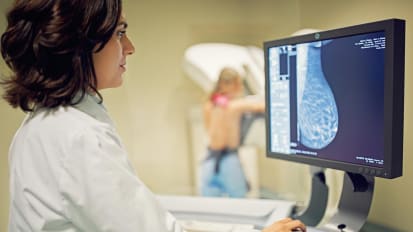 News
News
Inclusion of New Risk Factors Can Improve Prediction of Invasive Breast Cancer
UCSF researchers update Breast Cancer Surveillance Consortium model to account for BMI and other familial risk factors. News
News
UCSF Surgical Oncologists Providing New Treatment Options for Patients with Metastatic Gastrointestinal Cancers
UCSF Health’s surgical oncology team is a Bay Area leader in an innovative chemotherapy infusion pump used to treat patients with widely metastatic colorectal and bile duct cancers that have spread to the liver and are no longer considered operable. Video
Video
Screening for Cervical Cancer: New Evidence on Options and Outcomes
Gynecologic oncologist Megan Swanson, MD, MPH, deciphers recent changes to cervical cancer screening guidelines and uses the data to illuminate the relative value of test options – Pap smears, detection of high-risk HPV strains, or both tests together. News
News
Sorting Cancers by “Immune Archetypes” Represents Potential New Approach to Developing Precision Immunotherapies
Using data from over 300 patient tumors, UCSF researchers have described 12 classes of “immune archetypes” to classify cancer tumors. Their findings, published today in CELL, reveal that cancers from different parts of the body are immunologically similar to one another. These classifications provide unique strategies for enhancing each patient’s choice of cancer immunotherapies. News
News
Katherine Van Loon Named Editor-in-Chief of JCO Global Oncology
Katherine Van Loon, MD, MPH, has been appointed as the next editor-in-chief of JCO Global Oncology (JCO GO), an American Society of Clinical Oncology (ASCO) journal.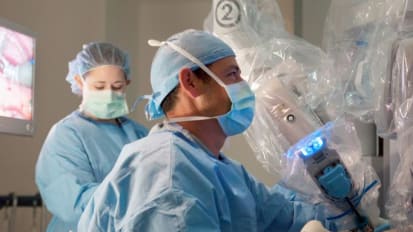 News
News
UCSF Surgeons Perform First Pure Robotic Whipple Surgery in the Bay Area
Gastrointestinal surgeons at UC San Francisco have performed the first pure robotically assisted Whipple surgery in San Francisco. Video
Video
UCSF Osher Center Overview: Integrative Medicine’s Value for Providers and Patients
Sanford C. Newmark, MD, medical director of the UCSF Osher Center for Integrative Medicine, explains what integrative medicine is (hint: it’s neither “alternative medicine” nor homeopathy) and how referred patients can benefit from its proven techniques. Document
Document
Cardio-Oncology & Immunology: Specialized Cardiovascular Care for Cancer Patients
Led by a multidisciplinary team of specialists and researchers, our program optimizes the cardiovascular health of cancer patients and cancer survivors. Video
Video
High Risk for Breast Cancer: Methods and Schedules to Ensure Optimal Screening
Hematologist-oncologist Elham Vosoughi, MD, starts with an update on breast cancer stats, noting that incidence in the United States is increasing by 1% every year – with an even sharper rise for women under 50. News
News
UCSF Clinic Fills Unmet Need for Managing Oral Side Effects of Cancer Therapies
As advances in cancer treatments have expanded, so has the number of side effects that impact the mouth. Oral medicine specialists at UC San Francisco are working to mitigate these often-debilitating problems, which affect the majority of patients undergoing or recovering from cancer therapy.

